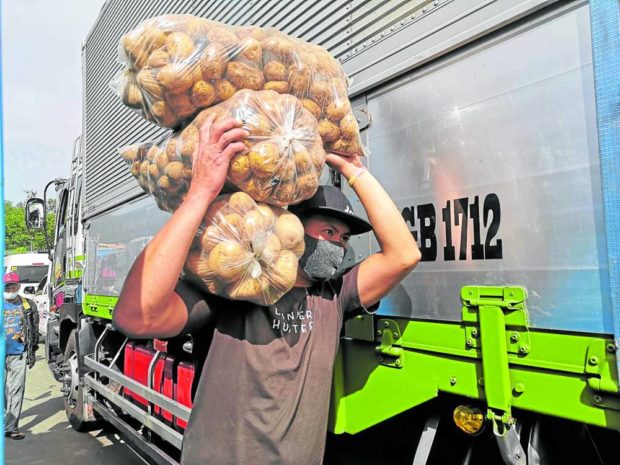Higher fees for veggie delivery ‘inevitable’

CHAIN REACTION Vegetable traders in Benguet say the increase in fuel cost will result in higher expenses for transportation and delivery that will eventually raise prices of farm products. —EV ESPIRITU
BAGUIO CITY — Vegetable truckers in Benguet province have started collecting additional transportation charges following the big increase in fuel prices on Tuesday, March 15.
Rudy Bulawan, president of Benguet Vegetable Truckers and Traders Association, said his group imposed an additional P0.50 per kilo on delivery charges starting Wednesday, noting that it was their “last resort” to survive the impact of the soaring fuel prices on the industry.
Truckers used to charge P3 to P4 per kilo of vegetables from traders at the vegetable trading post in Benguet’s capital town of La Trinidad.
“When fuel price was still at around P50 per liter, we already implemented alternate and combined trips due to the drop in demand [for vegetables],” Bulawan told the Inquirer on Wednesday.
But with the continuing fuel price increases, he said they were worried that even the scaled-down trip schedules would not help cover their expenses, including payment for their workers.
Bulawan said a 10-wheel truck consumes at least 200 liters of diesel for trips from Benguet to Metro Manila and its nearby areas and back, and if fuel prices continue to surge, higher delivery charges would be “inevitable.”
At midnight on Tuesday, several oil companies increased the price of diesel by P13.15 a liter, P7.10 a liter for gasoline, and P10.50 a liter for kerosene.
READ: Oil firms set biggest increase in fuel prices
This brought local pump prices to as much as P84 for diesel and P94 for gasoline here.
“It’s the consumers who will have to carry the burden of high vegetable prices as a result of the increased delivery fee that traders have to pay the truckers,” Bulawan said.
Demand
Bulawan pointed out that the demand for vegetables was just starting to pick up when pandemic-related restrictions were eased this month.
But he said the soaring fuel prices were already affecting the cost of vegetable production due to the high cost of farm inputs, which could again hurt local farmers.
Some 58,000 families in the provinces of Benguet, Ifugao, and Mountain Province are engaged in vegetable farming as their main source of livelihood in 2020, according to the second quarter report of the Philippine Statistics Authority last year.
Agot Balanoy, spokesperson for League of Associations at La Trinidad Vegetable Trading Post, said farmers were still struggling with loans they took out at the height of the pandemic in 2020 and 2021.
“Considering the prevailing low prices and low demand during this time of pandemic, farmers are still in dire need of capital,” Balanoy said in a separate interview.
She added: “And to make things worse, vegetable smuggling continues. We have been complaining about this for nine months now to no avail.”
The government task force against smuggling launched operations to seize smuggled vegetables last year, when farmers and traders in Benguet reported the influx of vegetables from China and other countries.
But Balanoy claimed that the volume of confiscated smuggled vegetables in at least three operations was “too low” compared with the volume flooding local markets.
RELATED STORIES
Additional P600-M fuel subsidy for farmers, fishers
Duterte nixes suspension of fuel excise tax; OKs P200 monthly subsidy to poor families